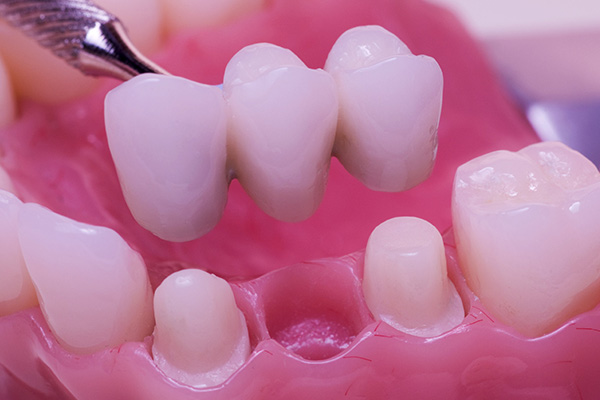How to Care for a Fixed Dental Bridge

After finally deciding to replace your lost tooth with a fixed dental bridge, you are left with the question: how do you care for your new dental restoration? Getting a new, healthy smile can be a little overwhelming and a big confidence booster. If you want to preserve the new smile and keep your teeth looking attractive for a long time, you need to learn the correct ways to care for your dental bridge.
Increasing the lifespan of your fixed dental bridge
With proper care, a fixed dental bridge can survive for ten years or more. The biggest threat to your new dental bridge is tooth decay, which is mostly caused when food debris gets stuck between your teeth or beneath the prosthetic tooth. If tooth decay occurs, the natural teeth holding the dental bridge on either side may falter and cause the bridge to fail. The following are ways to care for your fixed dental bridge and increase its lifespan.
Avoid chewing on ice or hard substances
Dental bridges and crowns are manufactured from ceramic, which is sturdy and durable, but like healthy teeth, they may break or fracture if subjected to undue force or pressure. Avoid bad habits like chewing ice or opening bottles or packages with your teeth. These acts can place your dental bridge at risk of damage.
Clean the dental bridge daily
You may think the fixed dental bridge is a prosthetic and requires no care, but this is wrong. You should take time to brush your dental restoration daily with a soft-bristle toothbrush to prevent possible accumulation of plaque and tartar on your teeth.
Do not forget to floss
Flossing is a crucial aspect of your oral care regimen, and you need to clean the spaces between the teeth and your gums properly to prevent plaque build-up or gum disease. Ensure you floss daily, especially after meals and before bedtime, making sure there are no particles left in your teeth.
Get a fluoride rinse
Although the purpose of getting the dental bridge is to get back the function and strength of the tooth crown above the gum line, you should take adequate care to ensure the gum line is in an optimal state. This is to prevent bacteria or plaque accumulation in this area. Brushing and flossing will help, but using a fluoride dental rinse will further fortify your dentition against tooth decay. This is especially recommended for people who are at higher risk of cavities or gum disease.
In conclusion
In the first few days of getting your dental bridge, you may notice minor sensitivity to hot or cold food or drinks. You can consult your dentist to get recommendations for products that may help lessen this symptom. Aside from your regular home care, you need to keep up with your bi-annual dental appointments for cleanings and exams. During your appointment, the dentist will check if your fixed dental bridges are correctly fitted and in good condition. With proper care, you should not need another dental bridge in years.
Request an appointment here: https://www.38md.com or call 38 Meserole Dental at (718) 709-3902 for an appointment in our Brooklyn office.
Check out what others are saying about our services on Yelp: Read our Yelp reviews.
Recent Posts
A bridge is a custom-made fixed dentistry restoration to fill the gap left by one or more missing teeth. The bridge restores dental function and helps preserve the appearance of your face. The dentist will recommend a suitable type of dental bridge based on the specific needs of the patient. This article covers what you…
Dentists commonly recommend dental crowns to protect teeth that have become structurally damaged due to a variety of problems, including severe cavities, infection, and other forms of tooth decay. The application of dental crowns is one of the most widespread dental procedures, so it is important for patients to understand how long they should be…
A dental crown is one of the most common ways to have a tooth restored. However, patients may want to know why the process of restoration is needed. It is a good question that can easily be answered.Outlined below are a few times when a dental crown is necessary. Dental crown placement will not only address…
Dental crowns are one of the most popular ways to restore teeth that are in bad shape. They are durable, reliable and most importantly, effective. The procedure itself is relatively straightforward, however, it is a good idea to become familiar with how things work beforehand. This ensures that the patient is prepared and knows what…


